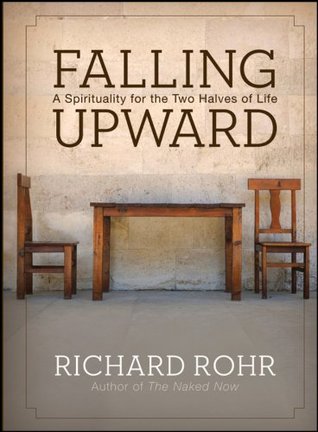More on this book
Community
Kindle Notes & Highlights
by
Richard Rohr
Read between
June 25 - July 4, 2019
There must be, and, if we are honest, there always will be at least one situation in our lives that we cannot fix, control, explain, change, or even understand.
Before the truth “sets you free,” it tends to make you miserable.
If we lived forever, they say, we would never take life seriously or learn to love what is.
Perhaps it has never struck you how consistently the great religious teachers and founders leave home, go on pilgrimage to far-off places, do a major turnabout, choose downward mobility;
The goal in sacred story is always to come back home, after getting the protagonist to leave home in the first place! A contradiction? A paradox? Yes, but now home has a whole new meaning, never imagined before. As always, it transcends but includes one's initial experience of home.
“Life is a luminous pause between two great mysteries, which themselves are one.”
It has been said that 90 percent of people seem to live 90 percent of their lives on cruise control, which is to be unconscious.
The shape of evil is much more superficiality and blindness than the usually listed “hot sins.”
If heaven is later, it is because it is first of all now.
When you do not know who you are, you push all enlightenment off into a possible future reward and punishment system, within which hardly anyone wins.
Life is all about practicing for heaven.
Everyone is in heaven when he or she has plenty of room for communion and no need for exclusion.
Either Jesus is the “savior of the world” (John 4:42), or he is not much of a savior at all. Either America treats the rest of the world democratically, or it does not really believe in democracy at all. That is the way I see it.
Without elders, a society perishes socially and spiritually.
Wisdom happily lives with mystery, doubt, and “unknowing,” and in such living, ironically resolves that very mystery to some degree.
I don't need to push the river as much now, or own the river, or get everybody in my precise river; nor do others have to name the river the same way I do in order for me to trust them or their goodwill. It takes lots of drowning in your own too tiny river to get to this big and good place.
We all become a well-disguised mirror image of anything that we fight too long or too directly.
Holier-than-thou people usually end up holier than nobody.
you talk too much or too loud, you are usually not an elder.
When you are young, you define yourself by differentiating yourself; now you look for the things we all share in common.
At this stage, I no longer have to prove that I or my group is the best, that my ethnicity is superior, that my religion is the only one that God loves, or that my role and place in society deserve superior treatment. I am not preoccupied with collecting more goods and services; quite simply, my desire and effort—every day—is to pay back, to give back to the world a bit of what I have received. I now realize that I have been gratuitously given to—from the universe, from society, and from God. I try now, as Elizabeth Seton said, to “live simply so that others can simply live.”
Your concern is not so much to have what you love anymore, but to love what you have—right now.
Your shadow is what you refuse to see about yourself, and what you do not want others to see.
The saint is precisely one who has no “I” to protect or project.
Divine union overrides any need for self-hatred or self-rejection.
truly holy people are always humble people.
Men are not free to cry, so they just transmute their tears into anger, and sometimes it pools up in their soul in the form of real depression.
Learn and obey the rules very well, so you will know how to break them properly. —THE DALAI LAMA
soul wisdom, which is seldom first of all practical, efficient, or revenue generating.
The human art form is in uniting fruitful activity with a contemplative stance—not one or the other, but always both at the same time.1
Basically, the first half of life is writing the text, and the second half is writing the commentary on that text.
You no longer need to divide the field of every moment between up and down, totally right or totally wrong, with me or against me.
here is the normal sequencing of the dualistic mind: it compares, it competes, it conflicts, it conspires, it condemns, it cancels out any contrary evidence, and it then crucifies with impunity.
most people do not see things as they are; rather, they see things as they are.
Whole people see and create wholeness wherever they go; split people see and create splits in everything and everybody.
Your second journey is all yours to walk or to avoid. My conviction is that some falling apart of the first journey is necessary for this to happen, so do not waste a moment of time lamenting poor parenting, lost job, failed relationship, physical handicap, gender identity, economic poverty, or even the tragedy of any kind of abuse. Pain is part of the deal. If you don't walk into the second half of your own life, it is you who do not want it.


